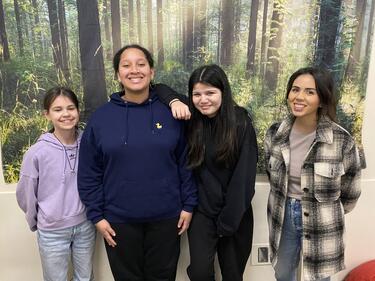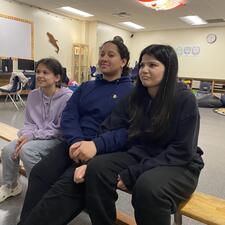
Agenda Gap: Shaping Youth Advocacy
Throughout the 2023/2024 school year, WA Fraser Middle School and Chief Dan George Middle have participated in a unique program called Agenda Gap. Agenda Gap is a research-driven program led by Dr. Emily Jenkins at UBC and funded by the Public Health Agency of Canada’s Mental Health Promotion – Innovation Fund. It is a facilitated program co-created with youth collaborators to support young people engaging in policy decision-making to enhance conditions for positive mental health for themselves and their communities. This program has been an amazing example of collaboration between two Abbotsford middle schools, the Indigenous Education Department and UBC.
The program is delivered over approximately six months through 20 two-to-three-hour engagement sessions held every couple of weeks. The group has alternated meetings at CDG, the Indigenous Center, and Fraser Middle.
The Agenda Gap program supports youth participants in growing their understanding of mental health promotion, social determinants of health, youth rights, and influencing system change, all while building peer and adult relationships and skills for policy advocacy.
Youth are engaged as Agenda Gap participants in a capacity-building process that, in addition to having the opportunity to gain mental health knowledge and skills, also enables them to amplify their voices.
We are halfway through the Agenda Gap program this year, and already our students have shown the need for a unique program like Agenda Gap, sharing, “I feel like nothing will change because it is just like middle schoolers, so they will not change it." Some students have shared that the unique approach to the topics creates a new approach to learning. One student shared, “It’s something I have never done before [learned about mental health], so it took a while to get used to." Over time, the group has provided a space where students are growing in their agency, as one student shares, "I really enjoy it. I really think it is good for youth to have an organization for youth to speak about how they feel and stuff". Another shared, "I kinda feel safe to talk about how I feel and what the problems are."
Students are now considering their mission statements as they continue to provide feedback on important aspects of their personal agendas. The continued opportunity for students to share their voice has revealed several areas where the direct impact of school policies and decision-making impacts them in their social, emotional being, and feeling of safety at school, which affects their ability to engage fully in school. These discussions have led to district leaders presenting student concerns and ideas for change and investigating issues of engagement and attendance at a deeper level to understand the impact of these policies across the district. The level of expertise in the room is impressive as our facilitators help our students see the impact that can have on their own schooling and its impact on the engagement of all.
GRAEME KEMP, VICE PRINCIPAL
W.A. Fraser Middle School
